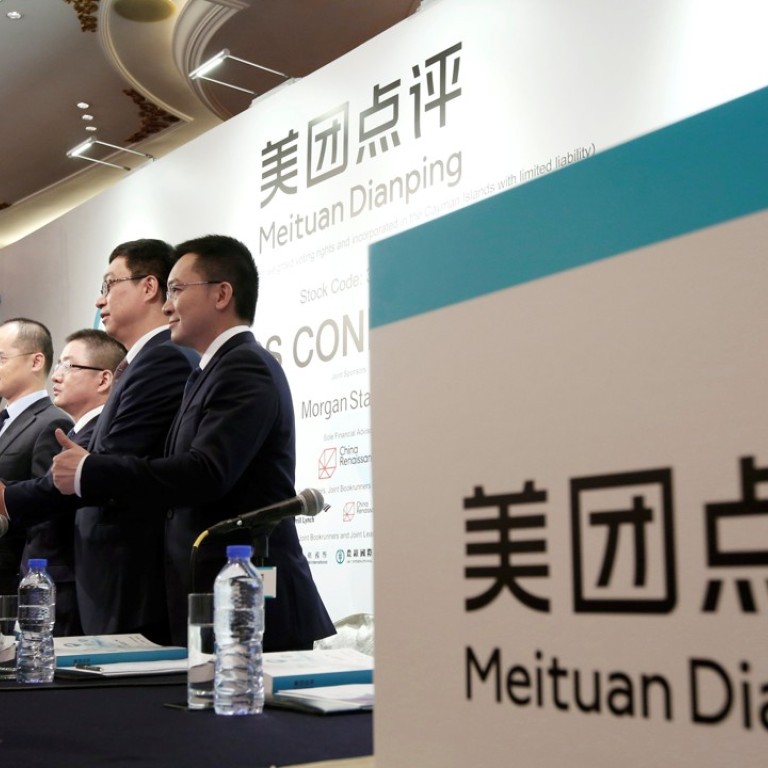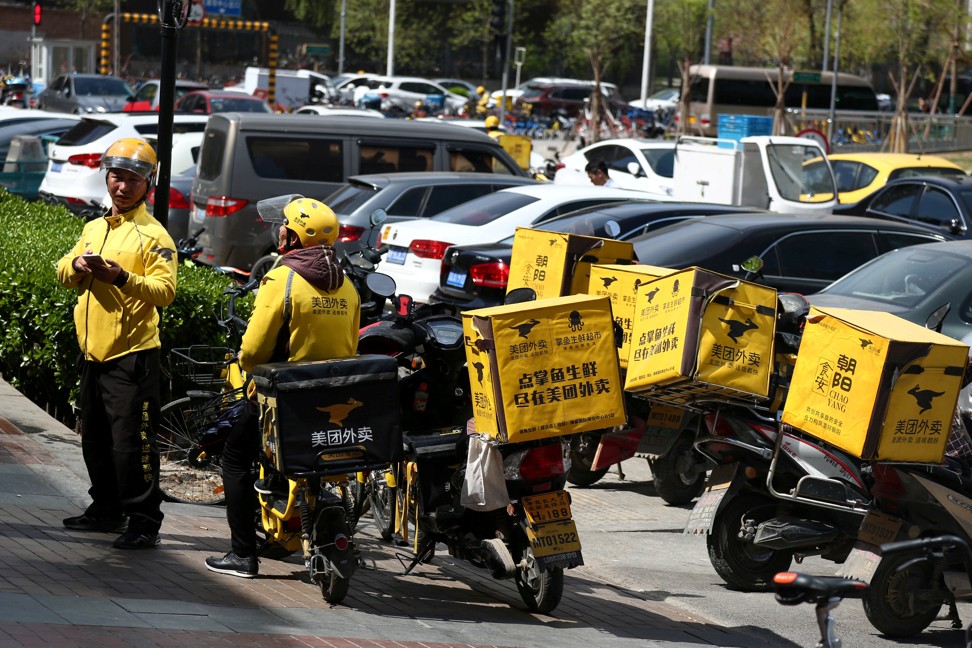
Meituan Dianping rises on Hong Kong debut after US$4.2 billion IPO, pushes co-founder’s net worth to US$5.3 billion
Wang Xing, CEO at food delivery service platform, now among China’s richest
China food delivery service platform Meituan Dianping closed up 5 per cent on its trading debut on Thursday, pushing co-founder Wang Xing’s net worth up to US$5.3 billion.
The company’s market cap reached about HK$400 billion (US$51 billion), exceeding that of many top Hong Kong companies on the benchmark index.
The Beijing-based company, which raised US$4.2 billion in the city’s second-biggest technology initial public offering this year, opened higher and briefly touched HK$74 per share. It closed the day at HK$72.65, up 5.3 per cent from its IPO price of HK$69. HK$8.4 billion worth of shares changed hands, 10 per cent of the main board’s turnover.
Wang, who is also CEO of Meituan, saw his 10.44 per cent stake in the company rise to HK$41.65 billion by the close.
This makes him the 30th richest man in China, ahead of Hongqiao Group chairman Zhang Shiping and Hope Group chairman Liu Yonghao, according to data from Bloomberg on Thursday.
Mu Rongjun, co-founder and senior vice-president of Meituan, also became a billionaire, with his 2.3 per cent share worth HK$9.18 billion. Wang Huiwen, another co-founder, saw his 0.66 per cent interest rising to HK$2.6 billion.
The company’s market cap stood at HK$398.94 billion. It has surpassed 42 of 50 Hang Seng Index components, including Hang Seng Bank, CK Hutchison Holdings and Hong Kong Exchanges & Clearing.
It also exceeded the US$38.6 billion market cap of e-commerce site JD.com, one of China’s largest internet companies by revenue. Both Meituan and JD.com have backing from China’s social media and gaming giant, Tencent Holdings.
Meituan is the second listed company on the Hong Kong stock exchange to have a weighted voting rights share structure, which gives founders greater voting power over other shareholders.
Tencent controls a 20 per cent share, while Sequoia Capital holds an 11 per cent stake. But Wang, along with the two other co-founders, retains majority voting rights through special class A shares, with each class A share equivalent to 10 votes. Tencent and Sequoia Capital own class B shares, with each having one vote.
Also on Thursday, the Hang Seng Indexes Company announced Meituan will be added to the Hang Seng family of indexes starting October 8, including the Hang Seng Composite Index and the Hang Seng Internet and Information Technology Index.
At its listing ceremony on Thursday, Wang thanked Steve Jobs, the late Apple founder and former CEO.
“Without Apple, without iPhone, without smartphones and the mobile internet, everything we have done today would not have been realised,” he said.
Meituan offers such services as food delivery, shopping, tickets and hotel booking on its app, which has 340 million users.
The company had said in its prospectus it will halt further expansion into China’s ride-hailing market, after Didi Chuxing struggled recently with a regulatory overhaul after the murder of a passenger last month caused a public outcry. Meituan conducted pilot operations in two Chinese cities earlier this year.
Chen Shaohui, chief financial officer for Meituan, said on Thursday at the listing ceremony that the company’s future focus will be on sectors related with “eating”, which have bigger growth potential.
He also said the company will further integrate Mobike into its operations and improve the bike-sharing service on Meituan’s app. In April, Meituan acquired bike-sharing firm Mobike for US$2.7 billion.
Meituan will strengthen its cooperation with Tencent going forward, Chen added. The two companies have already worked together on online traffic, cashless payments, marketing and map services.
Meituan’s IPO seems to have bucked a trend among recent IPOs in Hong Kong.
Seven out of the nine IPOs this month quickly dropped below their offer price on debut. In August, five out of eight IPOs did so, while the rest closed unchanged.

The offering received a mixed response from investors. Retail buyers placed orders 1.5 times the number of shares available. In contrast, China smartphone maker Xiaomi’s IPO saw retail investors oversubscribing to its IPO by 8.5 times, placing HK$23 billion worth of orders. In May, Ping An Good Doctor’s offering was oversubscribed by 653 times, tieing up HK$370 billion in investor deposits.
Institutional investors “heavily overbought” the stock, Meituan said in a recent exchange filing.
Li Ka-shing, Hong Kong’s richest man, subscribed for Meituan shares in the international placement, according to sources.
Joseph Lau Luen-hung, former chairman of Chinese Estates, and Adrian Cheng, executive vice-chairman of New World Development, were also among high-profile investors subscribing to the offering.
Hillhouse Capital and Tiger Fund, existing investors of the Beijing-based company, have also sought stakes in the IPO.
Five cornerstone investors had previously agreed to invest a combined US$1.5 billion, according to its prospectus. New York-based investment firm Oppenheimer Fund is its largest cornerstone investor, committing US$500 million.
Tencent, which already owns a 20 per cent stake in Meituan, is investing US$400 million.
London-based hedge fund Lansdowne Partners and New York-based asset manager Darsana Capital Partners have agreed to put in US$300 million and US$200 million, respectively.
China Structural Reform Fund, a state-owned restructuring fund backed by shareholders including China Chengtong Holdings, China Merchants Group and China Mobile, will invest US$100 million.

